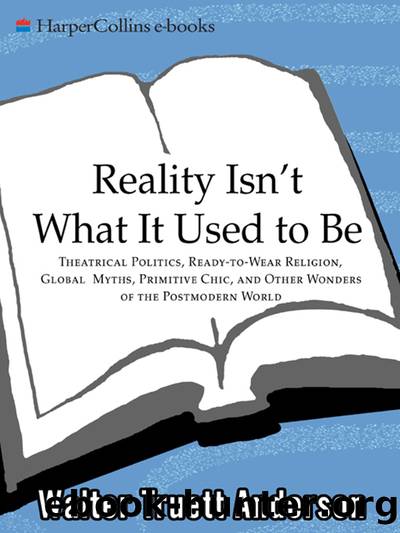Reality Isn't What It Used to Be by Walter Truet Anderson

Author:Walter Truet Anderson
Language: eng
Format: epub
Publisher: HarperCollins
TO BE SOMEBODY FEMALE
The worldâs largest course of constructivist therapy, the womenâs movement, has been under way for some decades now and shows no signs of nearing termination. If it ever does finish its work, no civilization in the world will be the same.
The womenâs movementâI think more than any political effort in our timeâis an attempt to change not only laws and power structures, but social constructions of reality. And some of its activities, like consciousness-raising groups, were innovative mixtures of politics and psychotherapy, based on understanding the linkage between personal and political change.
It is hardly surprising, then, that women are deeply involved in every aspect of the postmodern dialogue. As psychologist Maureen OâHara puts it: âWhen every âsystem of truthâ weâve ever known, from the oldest myth to modern medical science, has concluded that women are biologically, intellectually and morally inferior, that we are at once dangerous and naturally nurturing, that we are unsuitable for public office and should be protected and subjugatedâthen you bet feminists have a stake in conversations about âtruthâ and âreality.ââ11
The questions feminists raise go to the very heart of our most commonplace assumptions about human life. Isnât gender itself another one of our dreamed-up categories, built on doubtful assumptions and maintained by a fuzzy and culturally defined boundary that we try to persuade ourselves is a clear and ânaturalâ one? Donât different societies have entirely different ideas of what it means to be male or female? Doesnât the language embody biased statements about the difference between the sexes, beginning with the words âmanâ and âwoman,â with woman (from wifman) defined only as a sort of annex to the man? âSuch is the dilemma of the woman speaker,â writes philosopher Andrea Nye: âThat the categories of patriarchal language distort what she might like to sayâ¦.â12
So women have produced their own works in the sociology of knowledge, in cognitive science, and in critical studiesâand major figures in the postmodern intellectual world such as the French semiotician Julia Kristeva. They have challenged the gender assumptions and inequities built deeply into every social construction of reality, and they have proposed alternate realities.
Alternate realities, of course, because if old beliefs about womanhood and ways of being female are to be dispensed with, then new beliefs and new ways are called for. And some women recognize that the new beliefs and new ways are matters of choice. They see the task as not merely discovering the true femininity that lies beneath the false patriarchal construct, but creating something that has not existed before, not even in the never-never land of prehistory.
The womenâs movement has its own versions of the objectivist-constructivist polarizationâmore than one version. One such polarization, the one that has been around the longest and gotten the most publicity, is between female traditionalists, such as Phyllis Schlafly, who defend the old female roles and âwomenâs libâ feminists who think it is time for some new ones. Another polarization is between women who want to discover a new âessential
Download
This site does not store any files on its server. We only index and link to content provided by other sites. Please contact the content providers to delete copyright contents if any and email us, we'll remove relevant links or contents immediately.
De Catalaanse brief by Robert Goddard(369)
A Piece of Cake by Sarah Swatridge(279)
Churchill's Spearhead by John Greenacre(261)
Nonlinear Dynamics and Chaos with Student Solutions Manual by Steven H. Strogatz(237)
The Ruin of J. Robert Oppenheimer by Priscilla J. McMillan(207)
Flowering of the Cumberland by Harriette Simpson Arnow(193)
thing bounces back europe by Unknown(187)
Popular Culture and Political Identity in the Arab Gulf States by Alanoud Alsharekh Robert Springborg(182)
Allied Bombing Raids by Philip Kaplan(179)
Guild and State by Antony Black(171)
A Japanese View of Nature by Kinji Imanishi Pamela J. Asquith(170)
Comet Madness by Richard J. Goodrich(170)
History Without A Subject by David Ashley(163)
RAF at the Crossroads by Greg Baughen(156)
Shocking Bodies by Iwan Rhys Morus(149)
The Seventies Now: Culture As Surveillance by Stephen Paul Miller(149)
A History of Greek and Roman Philosophy by John Hackney(146)
Air Battle for Burma by Evans Bryn;(145)
A History of Science in Society by Ede Andrew;Cormack Lesley B.;(137)
